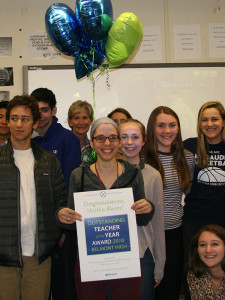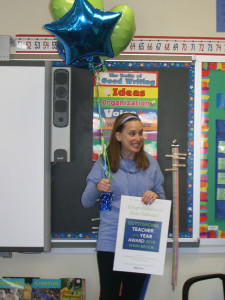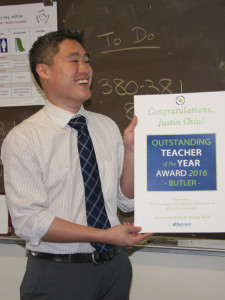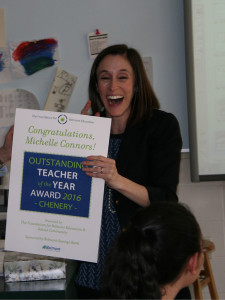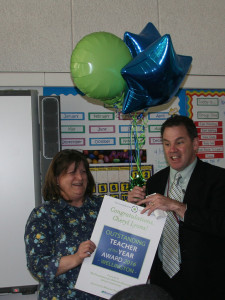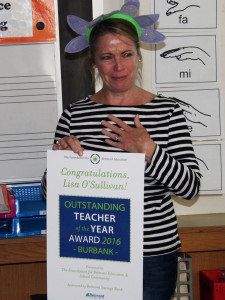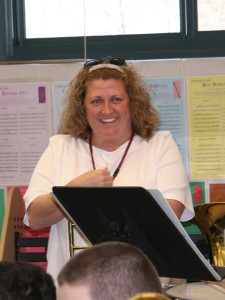Photo: The vote at Town Meeting.
With many members expressing a great amount of frustration with the process and the school’s administration, Belmont Special Town Meeting voted down the $144 million bond issuance plan for a new Minuteman Career and Technical High School building, 141-81, Wednesday night, May 4.
The overwhelming rejection of the project now places the future of the 628 student school in jeopardy as Belmont appear likely to be the only one of 10 communities in the Minuteman School District to vote against the plan.
“[T]his is the wrong school at the wrong time,” said Belmont Board of Selectmen’s Chair Mark Paolillo, who spoke against the plan which would have saddled Belmont with an annual bill of $350,000 to $500,000 to pay for its portion of the nearly $100 million to build the school.
Paolillo said approving a new school among the ten communities would end any meaningful incentive for cities and towns, including Watertown, Waltham, Medford, and Everett, outside the district that sends nearly 45 percent of the student population to join the district and help pay for the building.
While voicing its disappointment with the vote, leaders of the Minuteman administration contend they will move forward with the project and will push for the final two towns – Arlington and Needham – whose Town Meetings vote on Monday, May 9, “to stay the course” and approve the funding proposal, said Dr. Edward Bouquillon, Minuteman’s superintendent.
The Town Meeting vote – coming after two hours of presentations and debate – indicated that Minuteman could not close the deal with Belmont voters, as it was already starting behind the 8-Ball after the Board of Selectmen (unanimously), the Warrant Committee (8-6) and Capital Budget Committee (6-1) recommended “unfavorable action” in the article.
Jack Weis, a Town Meeting Member from Precinct 1 and Belmont’s representative to the Minuteman School Committee, presented the case for accepting the plan for replacing the deteriorating existing facility that has aged since it was built in 1974.
Since 2010, the school has been conducting a feasibility study that resulted in the administration would not support building a school for less than 600 students as it would limit the number of fields of study which they contend is critical to attracting students to fill the building. Weis told the assembly that building a school for about 400 students would cost about $120 million, which is not much savings.
While Weis admitted he believes the building is too big, “I get tripped up” when asking himself “will be better off if we vote ‘no?’” With nothing on the horizon in alternatives for Belmont students now and in the future, the better path, said Weis, was to seek approval of the new school funding.
Paolillo countered Weis and Minuteman, saying while he was prepared to vote ‘yes’ for a facility that met the needs and demands of the ten member districts, a 628-student building proposal was far too big for the municipalities who would be backing the bonds to fund the structure.
“I just can’t get to yes with a $144 million building,” said Paolillo, noting that the funding would need to be paid for via a debt exclusion vote, likely on the same ballot in 2018 as the possible $100 million debt exclusion for the renovation and new construction of Belmont High School.
Paolillo did not believe a “no” vote would kill a new building, just allow communities to continue negotiations.
“Maybe I’m an optimist, but I think that we can strike a new deal,” he said, rejecting the call by some that Belmont leaves the district and find an alternative school or program to educate the 26 students currently attending Minuteman.
When the floor was opened to residents, most speakers spoke of a frustration born of wishing to support vocational and technical education yet being unable to back the only project placed before them.
Bob McLaughlin, of Precinct 2 who with Paolillo and Weis worked on Belmont’s task force to the district, hammered the deal accusing the Minuteman administration of building a “Cadillac” school – it would become the most expensive vocational school in the Commonwealth if built – which could cost Belmont as much as $36,000 per student tuition but only if the school reaches the 628 maximum.
Long a critic of a larger high school building, McLaughlin said assertions by the Minuteman administration that out-of-district communities would pay their fair share of the capital expenses with a surcharge or by joining the district will not occur after the funding is OK’d.
“We are going to repeat history. The non-member towns are going to get a free load or a much cheaper load on the backs of the member towns,” he said.
Some members defended the proposal for the sake of all the students “who want more than doing college prep courses,” said
Roy Epstein, Pct. 6, and Warrant Committee member (who was one of the six “yes” votes) said there is no contingency plan [if it leaves the district] and we will have 60 days to decide to leave and then to do what? No one knows.”
Epstein said the town should take the risk that out-of-town communities will want to secure student spots in a brand new school by joining the system, “and build a new school.”
Carolyn Bishop, Pct. 1, said she had not heard any options for Minuteman. “What do we do with the students we can’t send because we didn’t approve a new school?”
“How can we meet the needs that Minuteman currently provides?” Bishop said, adding that she would “rather see something too large, we never erred on the side of too large. There are always ways to fill the spaces.”
But it soon became apparent that even members who were inclined to back the building plan due to the numerous questions that could not be answered.
Some pointed to the declining enrollment at Minuteman – a steady fall from 1,200 district students in the late 1970s to only 331 today – while other technical schools around the state are filled. Others focused on the non-member communities and their lack of cooperation in paying for the school.
“It’s starting to feel like this whole concept of member towns is totally ludicrous,” said Suzanne Robotham, Precinct 2, suggesting the town leaves the district and send the 26 students at the reduced rate.
Then there was the concern of which school the town should
“We may have only one realistic opportunity to go to the till of Belmont voters and ask for money, and my laser focus is on the 1,200 than the 26,” said Peter Whitmer from Precinct 6.
In the end, the combination of what many believed to be an oversized school without the assurances that it could be filled sent the proposal to a crushing 60 vote defeat.
